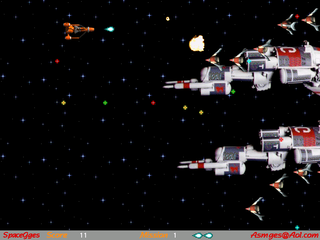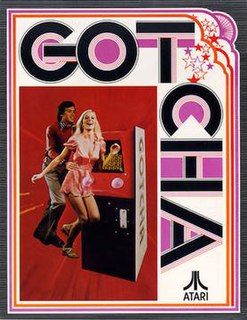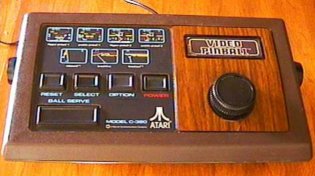
Pong is a table tennis–themed twitch arcade sports video game, featuring simple two-dimensional graphics, manufactured by Atari and originally released in 1972. It was one of the earliest arcade video games; it was created by Allan Alcorn as a training exercise assigned to him by Atari co-founder Nolan Bushnell, but Bushnell and Atari co-founder Ted Dabney were surprised by the quality of Alcorn's work and decided to manufacture the game. Bushnell based the game's concept on an electronic ping-pong game included in the Magnavox Odyssey, the first home video game console. In response, Magnavox later sued Atari for patent infringement.

The history of video games began in the 1950s and 1960s as computer scientists began designing simple games and simulations on mainframe computers, with MIT's Spacewar! in 1962 as one of the first such games to be played with a video display. The early 1970s brought the first consumer-ready video game hardware: the first home video game console, the Magnavox Odyssey, and the first arcade video games, Computer Space and Pong, the latter which was later made into a home console version. Numerous companies sprang up to capture Pong's success in both the arcade and the home by creating clones of the game, causing series of boom and bust cycles due to oversaturation and lack of innovation.

Nolan Kay Bushnell is an American businessman and electrical engineer. He established Atari, Inc. and the Chuck E. Cheese's Pizza Time Theatre chain. Bushnell has been inducted into the Video Game Hall of Fame and the Consumer Electronics Association Hall of Fame, received the BAFTA Fellowship and the Nations Restaurant News "Innovator of the Year" award, and was named one of Newsweek's "50 Men Who Changed America". Bushnell has started more than twenty companies and is one of the founding fathers of the video game industry. He is on the board of Anti-Aging Games. In 2012, he founded an educational software company called Brainrush, that is using video game technology in educational software.
A sports video game is a video game that simulates the practice of sports. Most sports have been recreated with a game, including team sports, track and field, extreme sports, and combat sports. Some games emphasize actually playing the sport, whilst others emphasize strategy and sport management. Some, such as Need for Speed, Arch Rivals and Punch-Out!!, satirize the sport for comic effect. This genre has been popular throughout the history of video games and is competitive, just like real-world sports. A number of game series feature the names and characteristics of real teams and players, and are updated annually to reflect real-world changes. The sports genre is one of the oldest genres in gaming history.

A video game genre is a classification assigned to a video game based on its core gameplay rather than visual or narrative features. A video game genre is normally defined by a set of gameplay challenges considered independently of setting or game-world content, unlike works of fiction that are expressed through other media, such as films or books. For example, a shooter game is still a shooter game, regardless of where or when it takes place.
Natsume is the name of two video game publishers, Natsume-Atari and Natsume Inc., that were once the same company but are now completely separated.

A video game clone is either a video game or a video game console very similar to, or heavily inspired by, a previous popular game or console. Clones are typically made to take financial advantage of the popularity of the cloned game or system, but clones may also result from earnest attempts to create homages or expand on game mechanics from the original game. An additional motivation unique to the medium of games as software with limited compatibility, is the desire to port a simulacrum of a game to platforms that the original is unavailable for or unsatisfactorily implemented on.
In video gaming parlance, a conversion is the production of a game on one computer or console that was originally written for another system. Over the years, video game conversion has taken form in a number of different ways, both in their style and the method in which they were converted.
In the history of video games, the first-generation era refers to the video games, video game consoles, and handheld video game consoles available from 1972 to 1983. Notable consoles of the first generation include the Odyssey series, the Atari Home Pong, the Coleco Telstar series and the Color TV-Game series. The generation ended with the Computer TV-Game in 1980, but many manufacturers had left the market prior due to the market decline in 1977 and the start of the second generation of video game consoles.

Atari: 80 Classic Games in One!, known as Atari Anthology on consoles, is a video game collection developed by Digital Eclipse and published by Atari Interactive. The title is a compilation of 1980 video games previously published by Atari, Inc. and Atari Corporation, reproducing Atari's games from its arcade and Atari 2600 game console platforms. Many games permit one to play each title at varying speeds, with time limits, or with a shifting color palette.

Gotcha is an arcade game developed by Atari and released in October 1973. It was the fourth game by the company, after the 1972 Pong, which marked the beginning of the commercial video game industry, and the 1973 Space Race and Pong Doubles. In the game, two players move through a maze, which continually changes over time. One player, the Pursuer, attempts to catch the other, the Pursued; if they do, a point is scored, and the players reset positions. The game emits an electronic beeping sound, which increases in pace as the Pursuer gets closer to the Pursued, and each game lasts a set amount of time.

The Video Pinball brand is a series of first-generation single-player dedicated home video game consoles manufactured, released and marketed by Atari, Inc. starting in 1977. Bumper controllers on the sides or a dial on the front are used to control the games depending on the game selected. There are three game types in the first model of the Video Pinball series: Pinball, Basketball, and Breakout.
MAGFest is an annual festival held in the Washington metropolitan area that celebrates video games and video game music, as well as their surrounding culture. MAGFest's primary features are a large open video gaming room, a hall of arcade cabinets, concerts by chiptune artists and video game cover bands, and a Bring Your Own Computer (BYOC) LAN Party.
Plasma Pong is an indie video game created by American developer Steve Taylor. In 2007, the game was put on hiatus in 2007 to respect Atari's Pong trademark.

Atari, Inc. was an American video game developer and home computer company founded in 1972 by Nolan Bushnell and Ted Dabney. Atari was responsible for the formation of the video arcade and modern video game industry.

Bit.Trip Beat, marketed as BIT.TRIP BEAT, is an arcade-style music video game developed by Gaijin Games and published by Aksys Games for the Wii's WiiWare download service. It was released in 2009 in North America, and released in Japan and PAL regions in the same year. It was later released for the Windows and Mac OS X through the download service Steam in 2010, while Namco Bandai published it for iOS on iPod Touch, iPhone, and iPad in both Bit.Trip Beat and Bit.Trip Beat HD versions. Android and Linux versions debuted in the Humble Android Bundle 3.

Atari 2600 homebrew is a term describing hobbyist-developed games for the Atari 2600 video game console. The first such game was written in 1995, and more than 100 have been released since then. The majority of games are unlicensed clones of games for other platforms, and many were written for the technical challenge. There are also ROM hacks and some original games. Several games have received attention outside the hobbyist community. Some have been included in a game anthology by Activision.
The Evercade is a handheld game console developed and manufactured by UK company Blaze Entertainment. It focuses on retrogaming with ROM cartridges that each contain a number of emulated games. Development began in 2018, and the console was released in May 2020, after a few delays. Upon its launch, the console offered 10 game cartridges with a combined total of 122 games.











